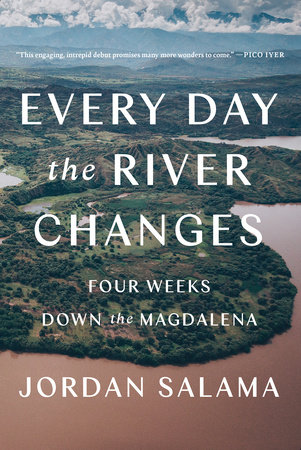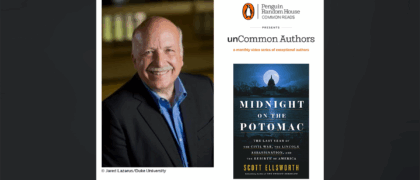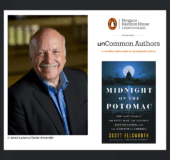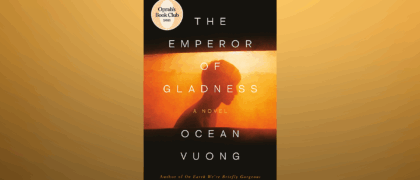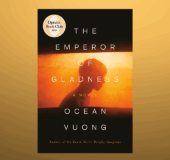 Over the summer, 1,500 Princeton first-years read alumnus Jordan Salama’s celebrated travelogue, Every Day the River Changes: Four Weeks Down the Magdalena. Salama, a Class of 2019 graduate, spoke in conversation with President Christopher L. Eisgruber, who wrote the following introduction for the custom edition of the book:
Over the summer, 1,500 Princeton first-years read alumnus Jordan Salama’s celebrated travelogue, Every Day the River Changes: Four Weeks Down the Magdalena. Salama, a Class of 2019 graduate, spoke in conversation with President Christopher L. Eisgruber, who wrote the following introduction for the custom edition of the book:
Dear Members of the GREAT Class of 2026,
Warm greetings from Princeton! My colleagues and I look forward to welcoming you to campus later this year. Your talents, interests, and perspectives will add tremendously to this community, and I am confident that you in turn will develop and grow through the experiences, interactions, challenges, and opportunities that await you here.
I am delighted to share with you this copy of the Princeton Pre-read selection for 2022, Jordan Salama’s Every Day the River Changes: Four Weeks Down the Magdalena. The Pre-read is one of the many traditions that you will encounter at Princeton and is part of a series of activities that will introduce you to the scholarly and communal life of the University.
In previous years, I have typically chosen Pre-reads written by faculty members or scholars from elsewhere whose work might appear on Princeton syllabi. Like those books, this Pre-read is an introduction to Princeton’s academic life, but with a twist: Jordan Salama is a member of Princeton’s Great Class of 2019, and this book grew out of his Princeton senior thesis.
Jordan’s book is a fresh approach to the old genre of travel writing. It invites us, as Jordan says, to join him not only in “a journey down a river” but also in “an immersion into the lives of the ordinary people who find themselves alongside it” (17). I like Every Day the River Changes for many reasons. Prominent among them is the deep empathy that informs Jordan’s treatment of the people he meets and the country through which he travels. His humane and respectful perspective is rare in today’s world, where public discourse too often bristles with anger, cynicism, or rage.
Jordan’s book will introduce you not only to the individuals, communities, and cultures that he encountered on his travels, but also to the kinds of opportunities that await you at Princeton. As Jordan reports his observations about Colombia, he also describes how his book benefitted from summer internships, coursework, extracurricular reading, and the encouragement that he received from mentors and friends.
I hope that Jordan’s story will inspire you to think imaginatively and creatively about what you might do with your time at Princeton. The possibilities are almost limitless. Indeed, I like to think that Jordan’s voyage of discovery may serve as an apt metaphor for the journey you are about to begin at Princeton—a place that will, I suspect, sometimes seem no less mysterious, foreign, or magical than the Magdalena river basin.
Like the Magdalena, Princeton, too, “changes every day”—and, I might add, it changes with every student. Your own adventures will undoubtedly differ from Jordan’s. Senior independent work, for example, is distinctive and individualized by design. Most Princeton alumni regard that work as a transformational and rewarding part of their time here, but very few senior theses become published books. My own thesis from 1983, I can assure you, has gathered more dust than citations! We will have many opportunities to talk about Every Day the River Changes when you arrive at Princeton. Jordan Salama will join us during Orientation to discuss the book. During the fall semester, I will host Pre-read precepts in the residential colleges.
I anticipate that these conversations will range over many topics, including questions about the goals that the book pursues, the topics it treats, and those that it leaves aside.
I encourage you to think about the book’s narrative perspective as you read it. Every Day the River Changes, like any book, inevitably reflects its author’s choices about how to interpret his encounters with people and the political, social, and historical context that shaped them. Jordan could have told his story about Colombia and the Magdalena differently. Indeed, various other storylines—about, for example, political strife, colonialism, crime, and inequality—emerge occasionally but remain subordinate to more intimate and personal vignettes. What are the strengths and weaknesses of this approach? Does Jordan do justice to the people and the region that he describes? What questions did he answer for you, and what questions did he provoke or leave lingering?
I look forward to discussing these ideas and others with you, and to welcoming you, when you arrive on campus later this year. In the meantime, I hope that you enjoy Every Day the River Changes, and I hope, too, that you have a wonderful and refreshing summer.
With very best wishes,
Christopher L. Eisgruber
Princeton, New Jersey
February 2022
Watch the Jordan speak with President Christopher L. Eisgruber here


